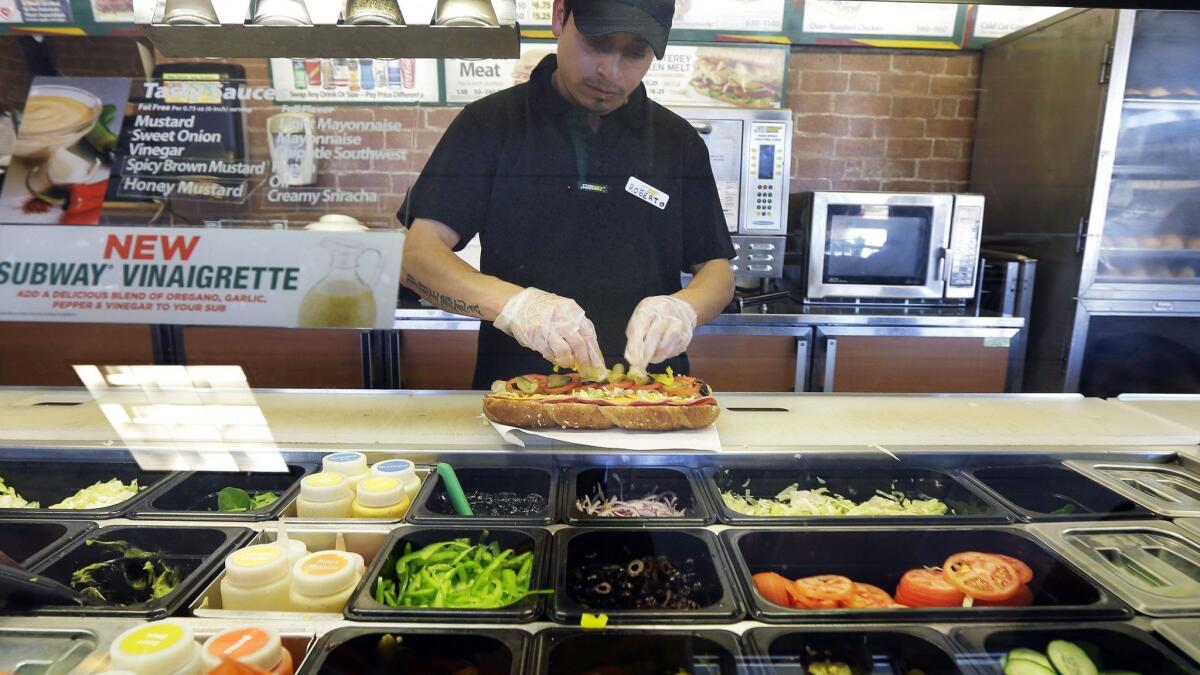Big national retailers plan to stop paying rent to offset coronavirus closures

- Share via
Major retail and restaurant chains, including Mattress Firm and Subway, are telling landlords they will withhold or slash rent in the coming months after closing stores to slow the coronavirus, according to people familiar with the situation.
In a brewing fight, chains are calling for rent reductions through lease amendments and other measures starting in April, said the people, who asked not to be named because the discussions are private.
These moves mark the next phase in virus fallout: What happens to billions in rent owed for businesses that have been closed?
The stakes are high. Retail has a slew of big chains in turnaround mode. And if they do withhold payments, there would be a ripple effect. Landlords can’t afford to stop collecting rent for long, with many property owners sitting on loads of debt.
The situation is likely to get messier. The U.S. relief packages being considered don’t directly address rents. But the Federal Reserve’s actions may give banks the leeway to defer mortgage payments, allowing property owners to delay rent. It’s also unclear if retailers can declare a so-called “force majeure,” a contract clause that covers highly unusual events, and if landlords could then make the same case to insurers.
“The court system is just going to get flooded with a million of these disputes between tenants and landlords,” said Vince Tibone, an analyst at Green Street Advisors. “If the government doesn’t step in in any form or fashion, it could get ugly. They need to respond quickly.”
Mattress Firm, with about 2,400 stores, sent landlords a letter last week saying it would cut rent in exchange for longer leases and offering two options to do so. This week, it sent a more urgent note revoking its earlier offer.
“The decline in revenue and forced store closures across the nation are more drastic, compressed and immediate than we originally anticipated,” the company wrote in a letter reviewed by Bloomberg. “Our need is now more severe,” the firm said, invoking the virus as a force majeure event that “will prevent or prohibit us” from paying rent.
After being contacted by Bloomberg, Mattress Firm confirmed that it has requested a temporary suspension of rent.
“We appreciate our landlord partners, and the responses have been encouraging so far,” Randy Carlin, chief real estate officer for Mattress Firm, said in a statement. “We will continue to do everything we can to maintain business continuity and to ensure there are jobs available for our people to return to when this crisis ends.”
Subway Restaurants, which has more than 20,000 U.S. locations, sent out a letter to landlords last week saying that it might cut or postpone rental payments due to the virus, according a person with knowledge of the situation. The Real Deal, a real estate trade publication, reported on the communication earlier.
In a statement, Subway said it was looking at ways to help franchises mitigate the virus fallout.
Some landlords have recognized they need to help smaller tenants. Irvine Co. Retail Properties, based in Irvine, is allowing rent to be deferred for 90 days and then paid back with no interest over a year starting in January, according to a document reviewed by Bloomberg. The company confirmed the practice without further comment.
Bedrock, a Detroit developer, said it will waive rent and other fees for three months for its smaller retail and restaurant tenants.
Retail real estate investment trusts may need to provide leeway on rent, Bank of America said this week after downgrading several REITs. The bank sees store closings lasting through May and the possibility of some locations going away as more fragile retailers are forced into bankruptcy.
More to Read
Inside the business of entertainment
The Wide Shot brings you news, analysis and insights on everything from streaming wars to production — and what it all means for the future.
You may occasionally receive promotional content from the Los Angeles Times.










